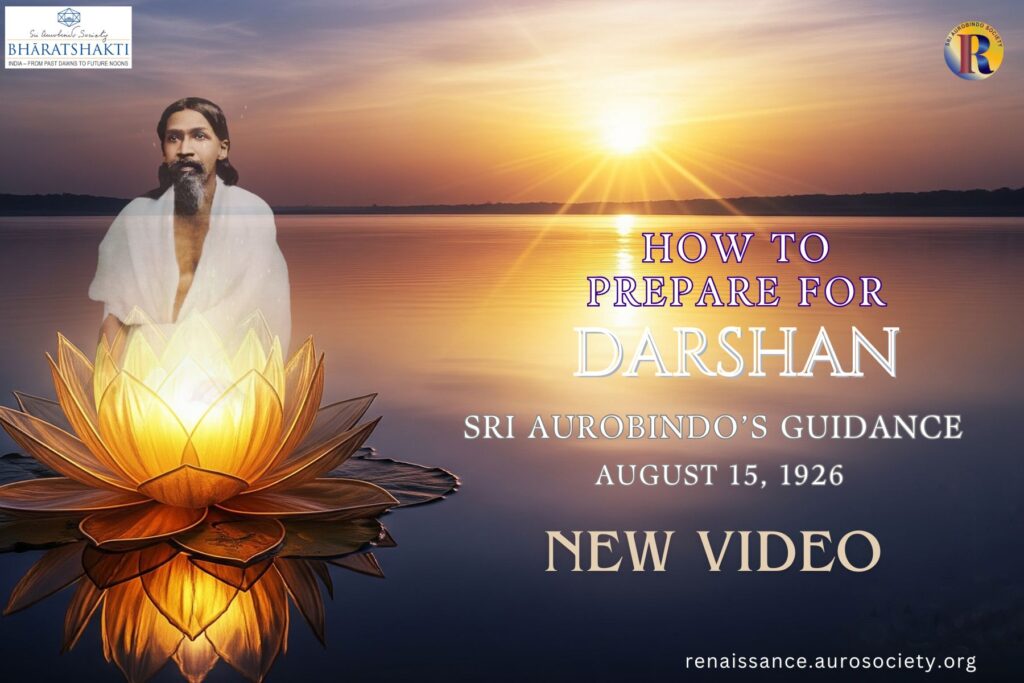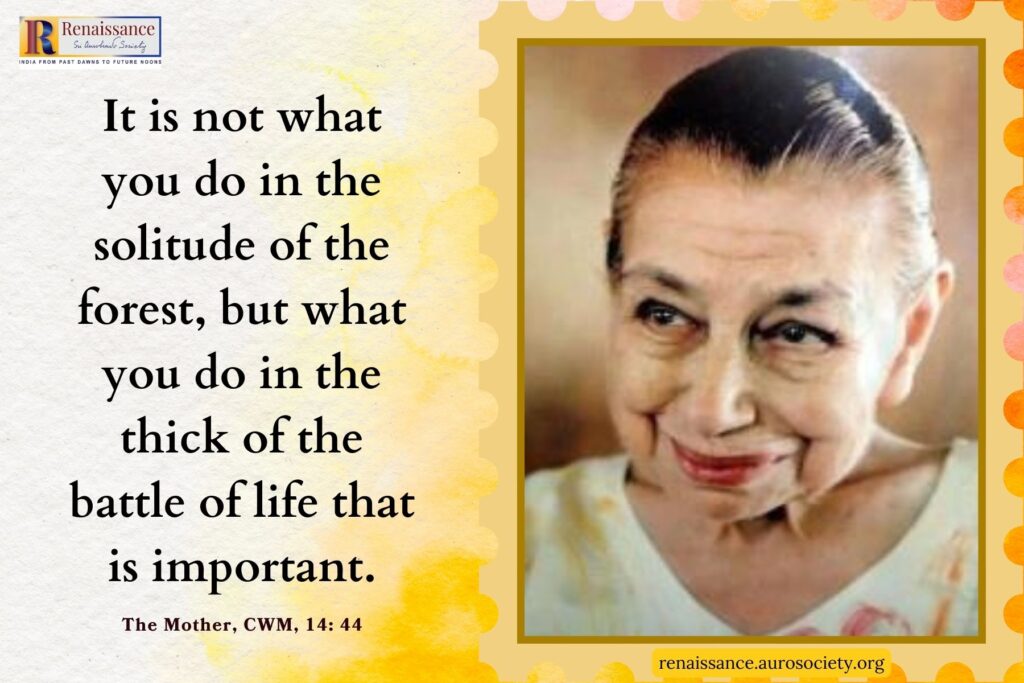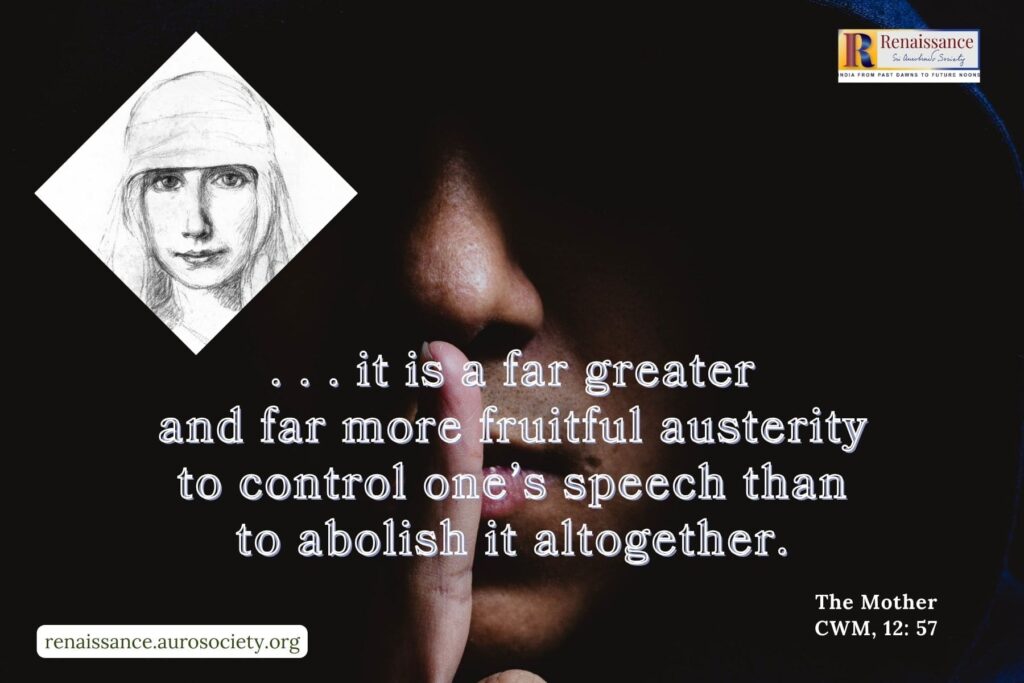Volume III, Issue 3
Author: The Mother
Editor’s note: We feature powerful commentaries of the Mother on two aphorisms of Sri Aurobindo in which she emphasises the necessity of getting rid of fear, distrust, despair and face all challenges in life with courage and strength if we aspire to walk the path of sadhana.

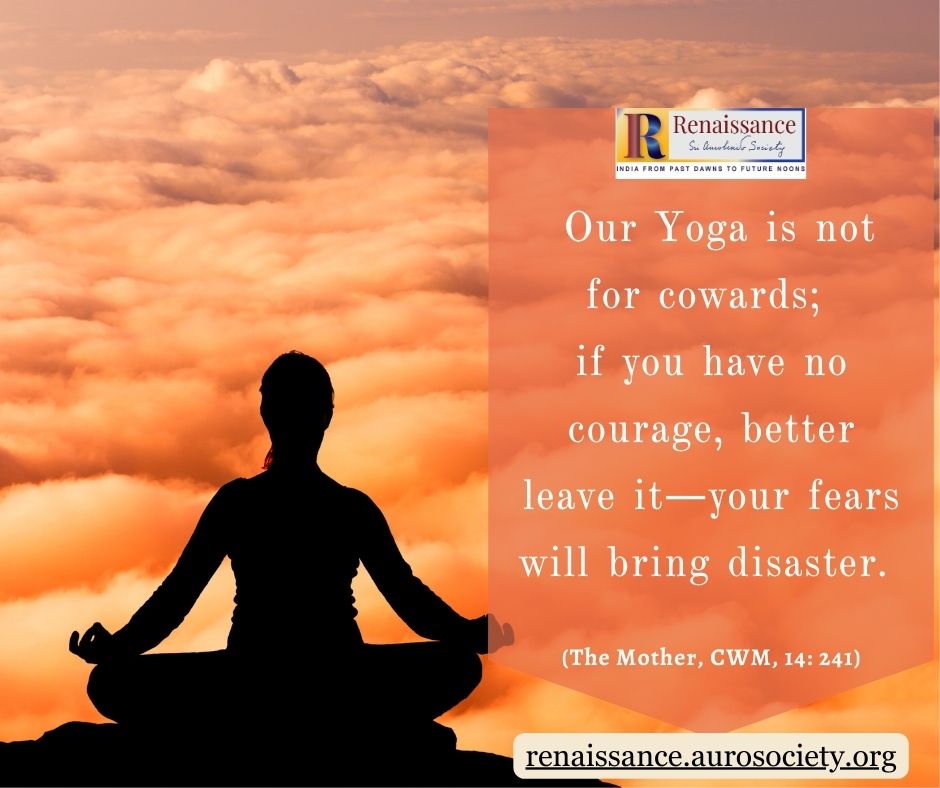
Aphorism 5
If mankind only caught a glimpse of what infinite enjoyments, what perfect forces, what luminous reaches of spontaneous knowledge, what wide calms of our being lie waiting for us in the tracts which our animal evolution has not yet conquered, they would leave all and never rest till they had gained these treasures. But the way is narrow, the doors are hard to force, and fear, distrust and scepticism are there, sentinels of Nature, to forbid the turning away of our feet from her ordinary pastures.
What Sri Aurobindo has written, the words [“caught a glimpse”] which have been translated as entrevoyaient, means to see something in its totality, but for a very brief moment. It is obvious that a constant vision of all these wonders would automatically compel you to set out on the path. It is also certain that a little fragmentary glimpse is not enough—it would not have enough weight to compel you to follow the path.
But if you had a total vision, however brief, you would not be able to resist the temptation of making the effort needed to realise it. But, in fact, the total vision is exceptional, and that is why Sri Aurobindo says to us: “If mankind only…”
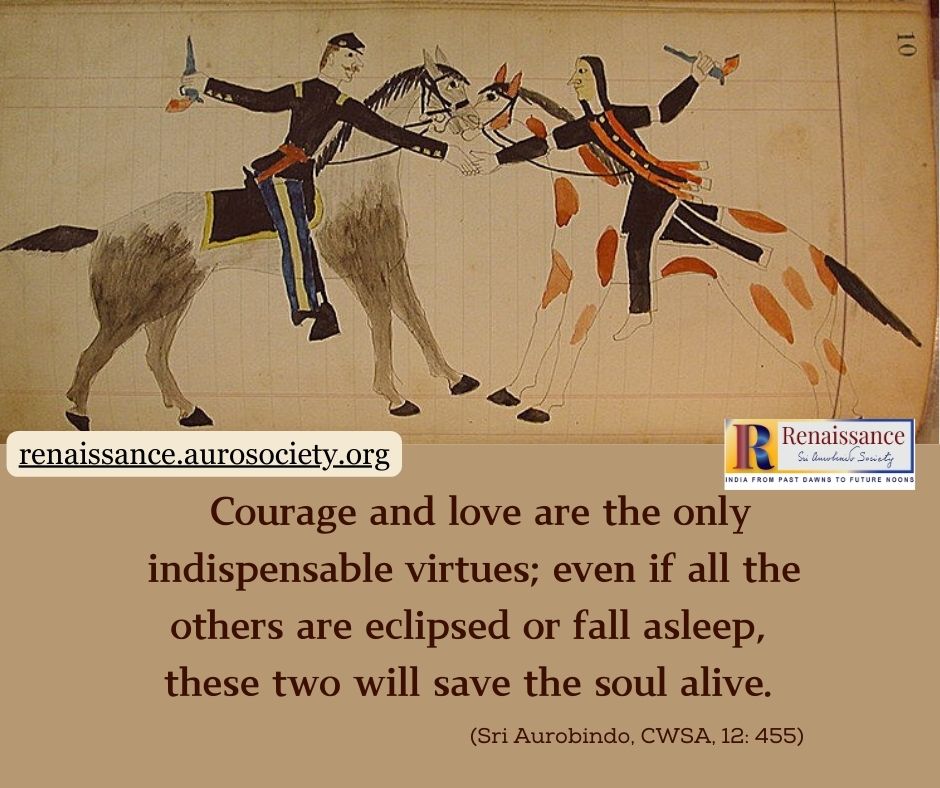
To tell the truth, it very seldom happens that those who are ready, who are undoubtedly meant for realisation, do not have, at a certain moment in their lives, even if only for a few seconds, the experience of what this realisation is.
But even those whose destiny is certain have to struggle mightily, resolutely, against this “something” which one seems to take in with the very air one breathes: this fear, this dread of what may happen.
And this is so stupid, because, in the final analysis, the destiny of each individual is the same: you are born, you live—more or less satisfactorily—and you die; then you wait for a certain length of time, and again you are born, you live—more or less satisfactorily—and again you die, and so on indefinitely, until you feel you have had enough of it.
Fear of what? Fear of coming out of the rut? Fear of being free? Fear of no longer being a prisoner?
And then, when you have enough courage to overcome this, when you say, “Come what may! After all, there’s not much to lose”, then you become wary, you wonder if it is reasonable, if it is true, if all that is not an illusion, if you are not just imagining things, if there is really any substance to it….
And mind you, this mistrust seems stupid, but you encounter it even in the most intelligent, even in those who have repeatedly had conclusive experiences—it is something that you take in with the food you eat, the air you breathe, your contacts with others; and that is why you can speak of the “tentacles of Nature”, everywhere, in all things, like an octopus stealing in and catching you and binding you.
Also see:
Having a Taste for the Supreme Adventure
Even when you have overcome these two obstacles, when the experiences are so strong that you can no longer doubt, that doubt becomes impossible—like doubting one’s own life—then there remains something awful, petty, dry, corrosive: scepticism.
And this is founded on human pride, that is why it lasts so long. You want to think that you are above all these things, “Oh, I am not one to fall into those traps! I am a reasonable man, I see things from a practical point of view; I’m not so easily deceived.” It is awful!… It is sordid. But it is dangerous.
Even in moments of greatest enthusiasm, even when one is filled with an exceptional, marvellous experience—it rises from the lowest depths. It is ugly, slimy, disgusting. And yet it rises, and spoils everything.
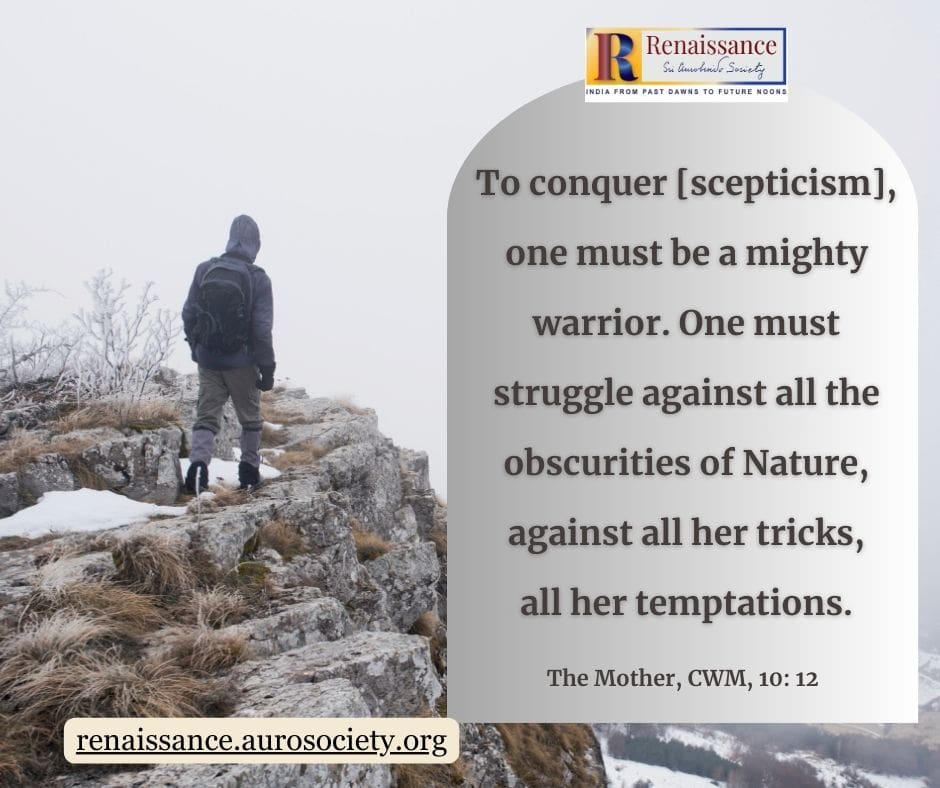
To conquer it, one must be a mighty warrior. One must struggle against all the obscurities of Nature, against all her tricks, all her temptations.
Why does she do this? It is as if she were moving away from her own goal. But I have already explained this to you many times.
Nature knows very well where she is going and what the outcome is. She wants it, but… in her own way. She does not feel that any time is being wasted. She has all eternity before her. She wants to follow her own way as she likes, meandering as much as she likes, going back on her tracks, straying from the straight path, starting the same thing all over again several times to see what will happen.
And these enlightened cranks, who want to get there at once, as soon as possible, who thirst for truth, light, beauty, balance—they bother her, they urge her on, they tell her that she is wasting her time. Her time! She always replies, “But I have all eternity before me. Am I in a hurry? Why are you in such a hurry?” And again, with a smile: “Your haste is all too human; widen yourselves, become infinite, be eternal, and you will no longer be in a hurry.”
There is so much fun on the way, for her… but not for everyone.
This is what happens when one sees things from a great height, from a great distance, when one’s view is vast, almost infinite. Everything that upsets human beings and makes them suffer, disappears; so those who are very wise, who have abandoned life for the sake of higher wisdom tell you with a smile, “Why suffer? Come out of it and you will suffer no more.”
That is all very well individually but, in fact, if you think about others you may wish this rather tragic comedy would come to an end sooner. And it is very justifiable to feel tired of living like a beast at pasture, of roaming from one patch of grass to another, of ruminating in a corner, of having such narrow horizons and of missing all the splendours of life.
Perhaps it amuses Nature that we should be like that, but we are tired of it, we want to be different.
And that is it. When you have truly had enough of it and want things to be different, then you have the courage, the strength, the capacity to conquer these three terrible enemies: fear, doubt and scepticism.
But I repeat, it is not enough to sit down one fine day, watch yourself be, and struggle with these things inside you once and for all. You have to do it and do it again and again and continue in a way which seems almost endless, to be sure that you have got rid of it all.
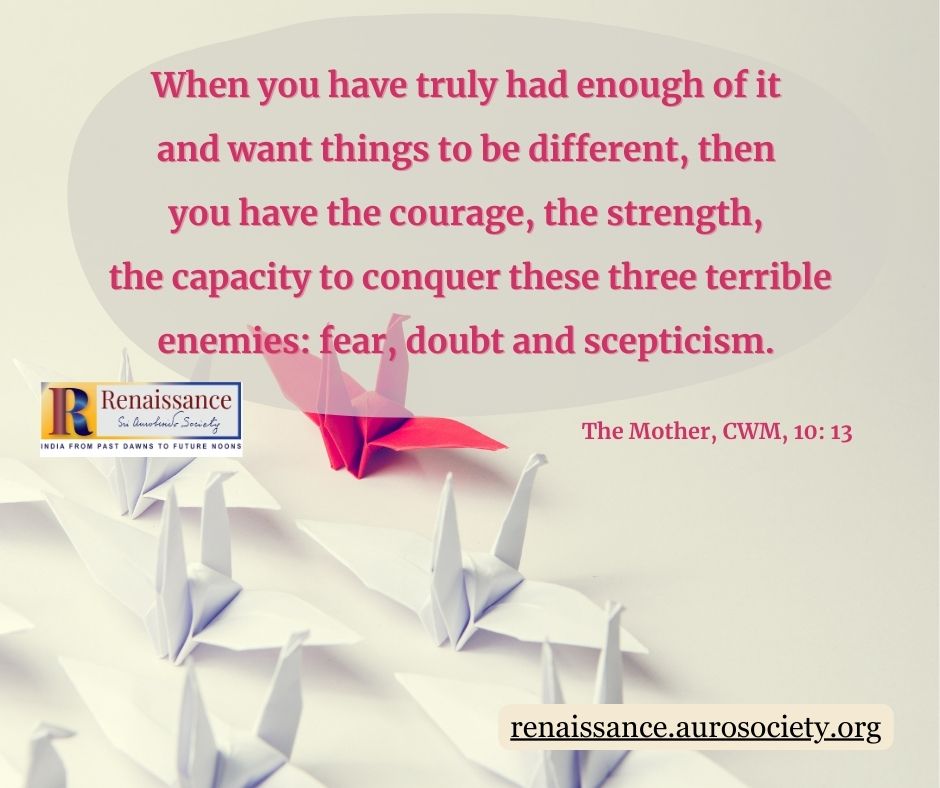
In reality, you are perhaps never truly rid of it, but there comes a time when inside yourself, you are so different that you can no longer be touched by these things. You can see them, but you see them with a smile, and at a simple gesture they go away, back to where they came from, perhaps a little changed, perhaps a little less strong, less obstinate, less aggressive—until the time when the Light is so strong that all darkness vanishes.
As for the marvels Sri Aurobindo tells us about, it is better not to describe them, because each individual feels them, undergoes them, experiences them in his own way—and for each person that is the best way. One must not adopt another’s way, one must go one’s own way, then the experience has its full value, its full inestimable value.
And finally, I wish that you may all have these experiences yourselves. And for that, faith, confidence, much humaneness and great goodwill are needed.
Open, aspire, and… wait. It will surely come, the Grace is there. It asks only to be able to work for everyone.
~ The Mother, CWM, Vol. 10, pp. 10-14

Aphorism 31
What I wished or thought to be the right thing does not come about; therefore it is clear that there is no All-Wise one who guides the world but only blind Chance or a brute Causality.
Disciple: For some people events are always contrary to what they desire or aspire for or believe to be good for them. They often despair. Is this a necessity for their progress?
Despair is never a necessity for progress, it is always a sign of weakness and tamas; it often indicates the presence of an adverse force, that is to say, a force that is purposely acting against sadhana.
So, in all circumstances of life you must always be very careful to guard against despair. Besides, this habit of being sombre, morose, of despairing, does not truly depend on events, but on a lack of faith in the nature. One who has faith, even if only in himself, can face all difficulties, all circumstances, even the most adverse, without discouragement or despair. He fights like a man to the end. Natures that lack faith also lack endurance and courage.
Sri Aurobindo tells us that for human beings the degree of success in physical life depends on the degree of harmony between the individual and universal physical Nature. Some people have a will which is spontaneously in tune with the will of Nature, and they succeed in everything they undertake; others, on the contrary, have a will which is more or less totally out of tune with the will of cosmic Nature and they fail in everything they do or try to do.
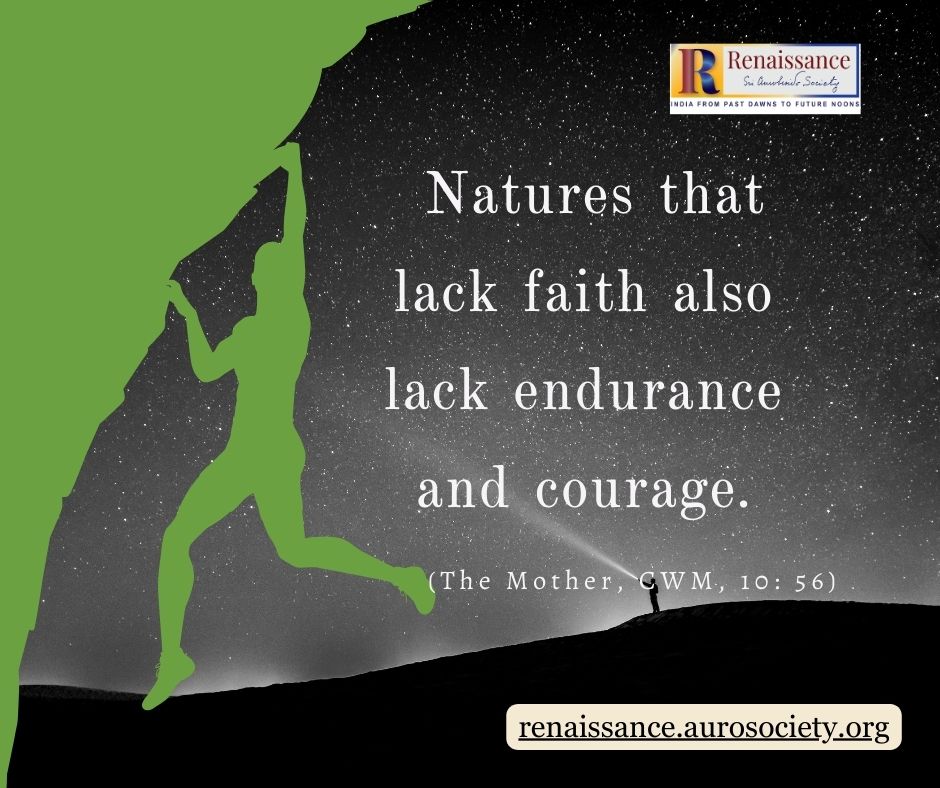
As for the question of what is necessary for progress, in an evolving world everything is necessarily a help to progress; but individual progress extends over a considerable number of lives and through innumerable experiences. It cannot be judged on the basis of a single life between birth and death.
On the whole, it is certain that the experience of a life of failure and defeat is just as useful to the soul’s growth as the experience of a life of success and victory; even more so, no doubt, than the experience of an uneventful life, as human existence usually is, in which success and failure, satisfaction and disappointment, pleasure and pain mingle and follow one another—a life that seems “natural” and does not require any great effort.
~ The Mother, CWM, Vol. 10, pp. 55-56

~ Design: Beloo Mehra and Biswajita Mohapatra

